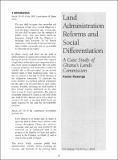| dc.contributor.author | Kasanga, Kasim | en |
| dc.date.accessioned | 2016-02-01T14:05:21Z | |
| dc.date.available | 2016-02-01T14:05:21Z | |
| dc.date.issued | 01/01/2001 | en |
| dc.identifier.citation | Kasanga, K. (2001) Land Administration Reforms and Social Differentiation: . IDS Bulletin 32(1): 57-64 | en |
| dc.identifier.issn | 1759-5436 | en |
| dc.identifier.uri | https://opendocs.ids.ac.uk/opendocs/handle/20.500.12413/8771 | |
| dc.description.abstract | Summaries The Lands Commission, as constituted under 1994 legislation, currently manages all public and vested lands and gives consent and concurrence to transactions of land held under customary or community tenure and managed by the chieftaincy (‘stool land’). Working through regional offices, it is supposed to plan land use in the region, develop a registration programme and manage public lands. But political interference and weak management have turned the Commission into an instrument of centralised patronage for the wealthy and those with official connections. It has also used its powers to expropriate community lands without proper compensation. It is now regarded with suspicion by the bulk of customary landholders and poor urban dwellers as the agent of a state?led centralisation of land rights. The author recommends that it become a more truly independent body, with its own source of revenues run on professional lines, and that management of community land held under customary tenure be handed back to the local, traditional authorities. | en |
| dc.format.extent | 8 | en |
| dc.publisher | Institute of Development Studies | en |
| dc.relation.ispartofseries | IDS Bulletin Vol. 32 Nos. 1 | en |
| dc.rights.uri | http://www.ids.ac.uk/files/dmfile/IDSOpenDocsStandardTermsOfUse.pdf | en |
| dc.title | Land Administration Reforms and Social Differentiation: | en |
| dc.type | Article | en |
| dc.rights.holder | © 2001 Institue of Development Studies | en |
| dc.identifier.doi | 10.1111/j.1759-5436.2001.mp32001007.x | en |

